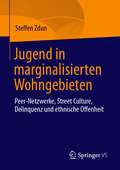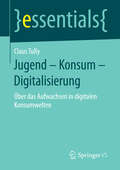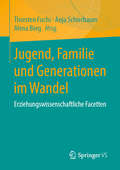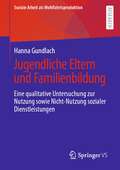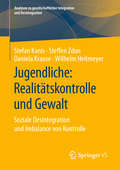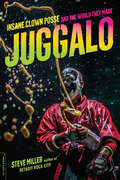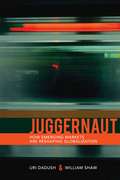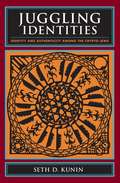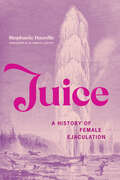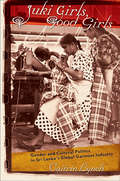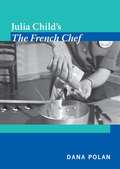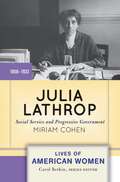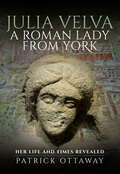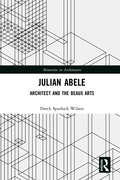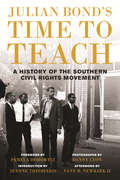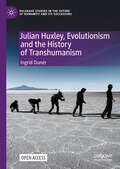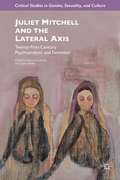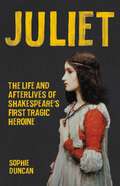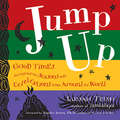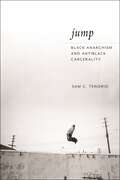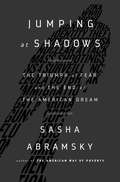- Table View
- List View
Jugend in marginalisierten Wohngebieten: Peer-Netzwerke, Street Culture, Delinquenz und ethnische Offenheit
by Steffen ZdunDieses Buch widmet sich einigen empirischen Blind Spots in der Forschung zu Jugendlichen in marginalisierten Wohngebieten. Neben neuen und vertiefenden Erkenntnissen in diesem Themenfeld wird nicht nur in das Konzept der ethnischen Offenheit eingeführt, sondern es werden hierzu auch Ergebnisse geliefert. Es wird thematisiert, was diese Heterogenität sowie die sonstige Diversität in den Peer-Netzwerken der Jugendlichen für die alltäglichen Aushandlungsprozesse und Verhaltensweisen bedeutet. Die Einblicke in die untersuchten Sozialräume beschränken sich hierbei nicht auf einen Defizitdiskurs, sondern loten auch deren Potenziale aus und fokussieren auf das Interaktionsgeschehen vor Ort und außerhalb.
Jugend – Konsum – Digitalisierung: Über das Aufwachsen in digitalen Konsumwelten (essentials)
by Claus TullyDie in diesem essential enthaltene Sekund#65533;ranalyse r#65533;ckt Befunde zum Konsum im Alltag Jugendlicher und junger Erwachsener in den Blick. Dazu werden vorliegende Jugendstudien sowie aktuelle jugendbezogene Untersuchungen und Ver#65533;ffentlichungen gesichtet, um in geraffter Form aktuelle Entwicklungen darzustellen. Entlang von neun Thesen wird der Leser in das Problemfeld von jungen Verbraucherinnen und Verbrauchern eingef#65533;hrt und erf#65533;hrt, wie Aufwachsen mit Konsum verwoben ist. Die Analyse schlie#65533;t mit #65533;berlegungen zur F#65533;rderung der Konsumentensouver#65533;nit#65533;t unter modernen gesellschaftlichen Bedingungen.
Jugend, Familie und Generationen im Wandel: Erziehungswissenschaftliche Facetten
by Alena Berg Thorsten Fuchs Anja SchierbaumJugend, Familie und Generationen sind durch einen fortschreitenden sozialen Wandel in allen Lebensbereichen charakterisiert. Eine Gesamtgestalt der vielgestaltigen Entwicklungen herauszuarbeiten, scheint kaum noch möglich. Im Zentrum des vorliegenden Bands steht daher die Erarbeitung von erziehungswissenschaftlichen Facetten. Die beteiligten Autorinnen und Autoren nehmen sich mit theoretisch-konzeptionellen Überlegungen und aktuellen Forschungsprojekten den Veränderungen (spät-)moderner Jugendwelten mitsamt den hierdurch hervortretenden wissenschaftlichen Herausforderungen an, diskutieren unterschiedliche Teilaspekte der Jugendforschung, reflektieren Konturen der Familienerziehung und setzen Stichworte um Generationenbeziehungen und -verhältnisse auf die Agenda. Die zusammengetragenen Befunde gleichen dabei dem Sehen mit einem Facettenauge, das – bestehend aus zahlreichen einzelnen Linsen – bei gleichbleibender Größe ein erstaunliches Gesamtbild zum Wandel von Jugend, Familie und Generationen liefert.
Jugendliche Eltern und Familienbildung: Eine qualitative Untersuchung zur Nutzung sowie Nicht-Nutzung sozialer Dienstleistungen (Soziale Arbeit als Wohlfahrtsproduktion #24)
by Hanna GundlachHanna Gundlach untersucht anhand von qualitativen Interviews und Fokusgruppen mit jugendlichen Eltern wie Fachkräften Bedingungen für die Nutzung sowie die Nicht-Nutzung von Angeboten der Familienbildung durch jugendliche Eltern. Im Ergebnis der handlungstheoretisch ausgerichteten Analyse wird eine aus den Daten heraus entwickelte Grounded Theory zur (Nicht-)Nutzung von Familienbildung durch jugendliche Eltern in Form eines Handlungsmodells vorgestellt. Durch das Handlungsmodell wird das komplexe Zusammenspiel von Bedingungen wie Konsequenzen der (Nicht-)Nutzung verdeutlicht, die sowohl auf die Lebenswelt der jugendlichen Eltern als auch auf die Angebote der Familienbildung bezogen sind.
Jugendliche: Soziale Desintegration und Imbalance von Kontrolle (Analysen zu gesellschaftlicher Integration und Desintegration)
by Wilhelm Heitmeyer Steffen Zdun Stefan Kanis Daniela KrauseDiese Studie begeht einen neuen Weg zur Erklärung von Devianz und Gewalt im Jugendalter, indem sie versucht, zwei soziologische Ansätze, die Theorie Sozialer Desintegration und die Control Balance Theory, miteinander zu verknüpfen. Es geht um die Frage der Realitätskontrolle über eigene Lebenswege aufgrund der Bedingungen in den verschiedenen Sozialisationsfeldern von Schule, Familie und Peers. Die leitende These der empirischen Untersuchung besagt, dass das Zusammenwirken von Anerkennungsdefiziten und Imbalancen von Kontrolle die Wahrscheinlichkeit von Devianz und Gewalt erhöht.
Juggalo: Insane Clown Posse and the World They Made
by Steve MillerJuggalo: Insane Clown Posse and the World They Made is a vivid journey into the heart of a misunderstood subculture. Through firsthand reporting, including interviews with Violent J and Shaggy 2 Dope of the Insane Clown Posse, their friends and family, and numerous devoted fans, Juggalo explores the lives of the proud outsiders who are frequently labeled as a threat or dismissed as a joke.Author and journalist Steve Miller follows ICP across America, hanging out with Juggalos before and after shows, at the legendary annual Gathering of the Juggalos, and at work and home to share their stories. In addition, Juggalo dives deep into the FBI's misguided assault on Juggalo culture and the misidentification of this devoted group of horrorcore fans as a gang.Juggalo is also the chronicle of two hard-luck kids from Detroit who created an empire and became the unwitting stars of a uniquely American grassroots success story. Without the help of radio airplay and with little love from the music industry establishment, ICP went platinum and fostered one of America's most durable subcultures.Juggalo is required reading for the hardcore fan and pop culture buff alike, a scrupulously researched account of a subculture unlike any other-one that so shook the establishment it launched a federal investigation-as well as a window into the world of the Juggalos and the singular mythology of their underworld apocalypse.
Juggernaut
by William Shaw Uri DadushAgainst the long sweep of economic history, the current moment is special. Living standards advanced so rapidly and across so many countries over the last decade that it is difficult to think of parallels-even the deepest recession since the Great Depression did not halt progress.In Juggernaut, Uri Dadush and William Shaw explore the rise of developing countries and how they will reshape the economic landscape. Dadush and Shaw project that the global economy will more than triple over the next forty years and the advance of a large group of developing countries-home to most of the world's population but seen as supplicants rather than trendsetters less than a generation ago-will drive this improvement. The authors systematically examine the effects of this seismic shift on the main avenues of globalization-trade, finance, migration, and the global commons-and identify the policy options available to leaders in managing the transformation.In the years to come, the rise of emerging economies will likely enhance prosperity but also create great tensions that could slow the process or even stop it in its tracks. Juggernaut calls for leadership by the largest countries in managing these tensions, and underscores the need to cultivate a "global conscience."
Juggling Identities: Identity and Authenticity Among the Crypto-Jews
by Seth KuninJuggling Identities is an extensive ethnography of the crypto-Jews who live deep within the Hispanic communities of the American Southwest. Critiquing scholars who challenge the cultural authenticity of these individuals, Seth D. Kunin builds a solid link between the crypto-Jews of New Mexico and their Spanish ancestors who secretly maintained their Jewish identity after converting to Catholicism, offering the strongest evidence yet of their ethnic and religious origins. Kunin adopts a unique approach to the lives of modern crypto-Jews, concentrating primarily on their understanding of Jewish tradition and the meaning they ascribe to ritual. He illuminates the complexity of this community, in which individuals and groups perform the same practice in diverse ways. Kunin supplements his ethnographic research with broader theories concerning the nature of identity and memory, which is especially applicable to crypto-Jews, whose culture resides mainly in memory. Kunin's work has wider implications, not only for other forms of crypto-Judaism (such as that found in the former Soviet Union) but also for the study of Judaism's fluid nature, which helps adherents adapt to new circumstances and knowledge. Kunin draws fascinating comparisons between the intricate ancestry of crypto-Jews and those of other ethnic communities living in the United States.
Jughead: The Matchmakers (Archie New Look Series)
by Melanie MorganFor years, Archie fans the world over wondered what their favorite Riverdale teens would look like if rendered in a realistic style. This time, the attention is on Archie's crowned, needle-nosed pal Forsythe P. Jones, AKA Jughead! The Matchmakers graphic novel recounts the entire story of Jughead and his new flame, Sandy Sanchez, as they turn Riverdale upside-down with their sudden romance!
Juice: A History of Female Ejaculation
by Stephanie HaerdleThe fascinating, little-known history of female sex fluids through the millennia.For over 2000 years, vulval sex fluids were understood to be a natural part of female pleasure, only to become disputed or categorically erased in the twentieth century. Today what do we really know about female ejaculation and squirting? What does the research show, and why are so many details unknown? In Juice, Stephanie Haerdle investigates the cultural history of female genital effluence across the globe and searches for answers as to why female ejaculation—which, according to some reports, is experienced by up to 69 percent of all women and those who have vulvas upon climaxing—has been banished to the margins as just another male sex fantasy.Haerdle charts female juices from the earliest explanations in the erotic writings of China and India, to interpretations of the fluids by physicians, philosophers, and poets in the Middle Ages and early modern period, to their denial, contestation, and suppression in late nineteenth-century Europe. As she shows, the history of ejaculation and squirting is a history of women, their desires, and the worship and denigration of the female body, as well as the cultural concepts of pleasure, sexuality, procreation, the body, masculinity, and femininity. By examining the fantasies and fears that have long accompanied them, Juice restores female gushes to their rightful place in our collective understanding so that they can once again be recognized, named, and experienced.
Juki Girls, Good Girls: Gender and Cultural Politics in Sri Lanka's Global Garment Industry
by Caitrin LynchWhen a government program brought garment factories to rural Sri Lanka, women workers found themselves caught between the pressures of a globalizing economy and societal expectations that villages are sanctuaries of tradition. These women learned quickly to resist the characterization of "Juki girls"—female garment workers already established in the urban sector—as vulgar and deracinated, instead asserting that they were "good girls" who could embody the nation's highest ideals of femininity. Caitrin Lynch shows how contemporary Sri Lankan women navigate a complex web of political, cultural, and socioeconomic forces. Drawing on extensive ethnographic research conducted inside export-oriented garment factories and a close examination of national policies intended to ease the way for globalization, Lynch details precisely how gender, nationalism, and globalization influence everyday life in Sri Lanka. This book includes autobiographical essays by garment workers about their efforts to attain the benefits of being seen as "good" while simultaneously expanding the definition of what sort of behavior constitutes appropriate conduct. These village garment workers struggled to reconcile the role thrust upon them as symbols of national progress with the negative public perception of factory workers. Lynch provides the context needed to appreciate the paradoxes that globalization creates while painting a sympathetic portrait of the individuals whose life stories appear in this book.
Julia Child's the French Chef
by Dana PolanJulia Child's TV show, The French Chef, was extraordinarily popular during its broadcast from 1963 until 1973. Child became a cultural icon in the 1960s, and, in the years since, she and her show have remained enduring influences on American cooking, American television, and American culture. In this concise book, Dana Polan considers what made Child's program such a success. It was not the first televised cooking show, but it did define and popularize the genre. Polan examines the development of the show, its day-to-day production, and its critical and fan reception. He argues that The French Chef changed the conventions of television's culinary culture by rendering personality indispensable. Child was energetic and enthusiastic, and her cooking lessons were never just about food preparation, although she was an effective and unpretentious instructor. They were also about social mobility, the discovery of foreign culture, and a personal enjoyment and fulfillment that promised to transcend domestic drudgery. Polan situates Julia Child and The French Chef in their historical and cultural moment, while never losing sight of Child's unique personality and captivating on-air presence.
Julia Lathrop: Social Service and Progressive Government
by Miriam CohenJulia Lathrop was a social servant, government activist, and social scientist who expanded notions of women's proper roles in public life during the early 1900s. Appointed as chief of the U.S. Children's Bureau, created in 1912 to promote child welfare, she was the first woman to head a United States federal agency. Throughout her life, Lathrop challenged the social norms of the time and became instrumental in shaping Progressive reform. She began her career at Hull House in Chicago, the nation's most famous social settlement, where she worked to improve public and private welfare for poor people, helped establish America's first juvenile court, and pushed for immigrant rights. Lathrop was also co-founder of one of America's first schools of social work. Later in life she became a leader in the League of Women Voters and an advisor on child welfare to the League of Nations. Following Lathrop's life from her childhood and college education through her social service and government work, this book gives an overview of her enduring contribution to progressive politics, women's employment, and women's education. It also offers a look at how one influential woman worked within the bounds of traditional conventions about gender, race, and class, and also pushed against them.About the Lives of American Women series:Selected and edited by renowned women's historian Carol Berkin, these brief biographies are designed for use in undergraduate courses. Rather than a comprehensive approach, each biography focuses instead on a particular aspect of a woman's life that is emblematic of her time, or which made her a pivotal figure in the era. The emphasis is on a "good read,” featuring accessible writing and compelling narratives, without sacrificing sound scholarship and academic integrity. Primary sources at the end of each biography reveal the subject's perspective in her own words. Study questions and an annotated bibliography support the student reader.
Julia Velva, A Roman Lady from York: Her Life and Times Revealed
by Patrick OttawayThe tombstone of Julia Velva, one of the best-preserved examples from Roman Britain, was found close to a Roman road just outside the center of York. Fifty years old when she died in the early third century, Julia Velva was probably from a wealthy family able to afford a fine monument. Patrick Ottaway uses the tombstone as the starting point to investigate what the world she lived in was like. Drawing on the latest archaeological discoveries and scientific techniques, the author describes the development of Roman York’s legionary fortress, civilian town and surrounding landscape. He also looks at manufacturing and trade, and considers the structure of local society along with the latest analytical evidence for people of different ethnic backgrounds. Aspects of daily life discussed include literacy, costume, cosmetics and diet. There are also chapters dedicated to the abundant York evidence for religion and burial customs. This book presents a picture of what one would have found on the edge of a great Empire at a time when York itself was at the height of its importance. Illustrated with dozens of photographs, specially prepared plans and illustrations, this is an excellent study of one of Roman Britain’s most important places.
Julia de Burgos: La creación de un ícono puertorriqueño
by Vanessa Perez-RosarioDurante más de cincuenta años, Julia de Burgos ha evocado sentimientos de identidad y unión entre puertorriqueños y latinxs en Estados Unidos. Vanessa Pérez-Rosario va más allá del enfoque trágico de otras biografías de Burgos para examinar la vida de la artista considerando el trasfondo de la cultura puertorriqueña y la compleja historia de la isla y la diáspora. Enfocándose en Burgos como escritora y activista, Pérez-Rosario profundiza en su desarrollo artístico, su experiencia como migrante, sus luchas contra el colonialismo y la injusticia social y sus contribuciones a la cultura literaria y visual latinoamericanas. Al mismo tiempo, desentraña las dinámicas culturales y políticas que operan en las revisiones y reinvenciones de Burgos que escritores y artistas latinxs contemporáneos en Nueva York llevan a cabo para imaginar nuevas posibilidades para sí mismos y sus comunidades. Disponible por primera vez en español, Julia de Burgos cuenta la destacada historia de la poeta y activista puertorriqueña.
Julian Abele: Architect and the Beaux Arts (Minorities in Architecture)
by Dreck Spurlock WilsonJulian Abele, Architect and the Beaux Arts uncovers the life of one of the first beaux arts trained African American architects. Overcoming racial segregation at the beginning of the twentieth century, Abele received his architecture degree from the University of Pennsylvania in 1902. Wilson traces Abele’s progress as he went on to become the most formally educated architect in America at that time. Abele later contributed to the architectural history of America by designing over 200 buildings throughout his career including the Widener Memorial Library (1913) at Harvard University and the Free Library of Philadelphia (1917). Architectural history is a valuable resource for those studying architecture. As such this book is beneficial for academics and students of architecture and architectural historians with a particular interest in minority discussions.
Julian Bond’s Time to Teach: A History of the Southern Civil Rights Movement
by Julian BondA masterclass in the civil rights movement from one of the legendary activists who led it.Horace "Julian" Bond was an influential social justice activist, politician, and visionary who is best known as one of the founders of the Student Nonviolent Coordinating Committee (SNCC). For over two decades, he taught a popular class at the University of Virginia on the history of the civil rights movement.Compiled from his original lecture notes, Julian Bond's Time to Teach brings his invaluable teachings to a new generation of readers and provides a necessary toolkit for today's activists in the era of Black Lives Matter and #MeToo. Bond sought to dismantle the perception of the civil rights movement as a peaceful and respectable protest that quickly garnered widespread support. Through his lectures, Bond detailed the ground-shaking disruption the movement caused, its immense unpopularity at the time, and the bravery of activists, some very young, who chose to disturb order to pursue justice.Beginning with the movement's origins in the early twentieth century, Bond tackles key events such as the Montgomery bus boycott, the Little Rock Nine, Freedom Rides, sit-ins, Mississippi voter registration, the Sixteenth Street Baptist Church Bombing, the March on Washington, the Civil Rights Act, Freedom Summer, and Selma. He explains the youth activism, community ties, and strategizing required to build strenuous and successful movements. With these firsthand accounts of the civil rights movement and original photos from Danny Lyon, Julian Bond's Time to Teach makes history come alive.
Julian Huxley, Evolutionism and the History of Transhumanism (Palgrave Studies in the Future of Humanity and its Successors)
by Ingrid DunérThe evolutionary biologist Julian Huxley (1887–1975) attempted to promote a “religion for the future,” which he would come to refer to as Transhumanism. Transhumanism was an attempt to unite a more traditional humanistic view of the human as containing some form of core essence or potential with an evolutionary point of view of humans as a work in progress. Before humans, natural selection had been responsible for the transformation of life. Through its ordering principles and through chance, it had given rise to humankind, which had ushered in a new phase of evolution. Humanity stood on the threshold of yet another critical point in evolution: The consciously purposive phase of evolution. This open access book explores the history of transhumanism by analyzing how Julian Huxley’s transhumanism develops and why it does at this particular point in time, by placing it firmly within the context of his specific scientific and sociopolitical milieu, starting roughly in the interwar years and stretching over the Second World War to the 1970s. Continuing, the study then focuses on the new transhumanists of the 1970s, 1980s and 1990s and investigates continuity in mode of thinking, contributing to a more coherent understanding of transhumanism, its history and of modern projects of human enhancement. The book captures how scientific and technological development in relation to society and social order shapes images and expectations of the future and of what future is desirable.
Juliet Mitchell and the Lateral Axis: Twenty-first Century Psychoanalysis And Feminism (Critical Studies In Gender, Sexuality, And Culture Ser.)
by Robbie Duschinsky Susan WalkerThis volume fills the gap in books dedicated to the ideas of ground-breaking theorist Juliet Mitchell. Essays from internationally renowned scholars address themes that cross-cut her oeuvre: equality, violence, collective movements, subjectivity, sexuality and power. Mitchell herself contributes a chapter and an afterward.
Juliet: The Life and Afterlives of Shakespeare's First Tragic Heroine
by Sophie DuncanThe enduring cultural legacy of Shakespeare&’s Juliet Capulet — a history "as vital and provocative as the character herself" (Literary Review).Romeo and Juliet may be the greatest love story ever told, but who is Juliet? Demure ingénue? Or dangerous Mediterranean madwoman? From tearstained copies of the First Folio to Civil War-era fanfiction, Shakespeare&’s star-crossed heroine has long captured our collective imagination. Juliet is her story, traced across continents through four centuries of history, theatre, and film. As Oxford Shakespeare scholar Sophie Duncan reveals, Juliet&’s legacy stretches beyond her literary lifespan into a cultural afterlife ranging from enslaved African girls in the British Caribbean to the real-life Juliets of sectarian violence in Bosnia and Belfast. She argues that our dangerous obsession with the beautiful dead teenager and Juliet&’s meteoric rise as a defiant sexual icon have come to define the Western ideal of romance. Wry and inventive, Juliet is a tribute to fiction&’s most famous teenage girl who died young, but who lives forever.
Julius Caesar: A Life
by Antony KammThis is a fresh account of Julius Caesar - the brilliant politician and intriguing figure who became sole ruler of the Roman Empire. Julius Caesar examines key figures such as Marius, Sulla, Cicero, Mark Antony, Gaius Octavius (emperor Augustus), Calpurnia and Cleopatra, as well as the unnamed warriors who fought for and against him, and politicians who supported and opposed him. Including new translations from classical sources, Antony Kamm sets Caesar’s life against the historical, political and social background of the times and addresses key issues: Did Caesar destroy the Republic? What was the legality of his position and the moral justifications of his actions How good a general was he? What was his relationship with Cleopatra? Why was he assassinated? What happened next? This is Caesar – the lavish spender, the military strategist, a considerable orator and historical writer, and probably the most influential figure of his time - in all his historical glory. Students of Rome and its figures will find this an enthralling, eye-opening addition to their course reading.
Jump Up: Good Times throughout the Seasons with Celebrations from Around the World
by Luisah TeishVirtually all peoples of the world celebrate the passage of seasons. The continual movement of time through winter, spring, summer, and autumn has framed human experience and profoundly affected the lives of individuals and communities for many thousands of years.Celebrations that mark the seasons are rich with food, music, dance, offerings, and the reenactment of myth. Jump Up (titled after a Caribbean phrase that is used to describe a celebration) is meant to reacquaint readers with these traditions and to give them suggested practices for honoring past traditions in new ways.African traditions form the core of the book, and ceremonies and practices from Europe, Asia, the Americas, and the South Pacific are interwoven throughout. Readers will encounter the origin of well-known holidays and, at the same time, learn about others that are unknown in the Western world. Some of the more familiar cultural-based seasonal holidays that appear in this book include Christmas, New Year's Day, Mardi Gras, Palm Sunday, Easter, May Day, Day of the Dead, and the African American holiday of Kwaanza.Each season's story is accompanied by recipes, suggestions and guidelines for rituals to help readers create their own celebrations. One winter ritual, complete with instructions, is the Ritual of the Cleansing Fire, and an autumn ritual is the Building of the Autumn Equinox Altar. The recommended rituals are generic, and they can be done in conjunction with or in place of traditional holidays. Laced with myth, folklore, and poetry, Jump Up celebrates life, enlivens the spirit, and strengthens the bonds of community.
Jump: Black Anarchism and Antiblack Carcerality
by Sam C. TenorioAsks how we can better understand a politics of refusalWriting a new story of Black politics, Jump emerges from the practice of enslaved Africans jumping overboard off their slavers’ ships. Reading against the narrative that depoliticizes and denigrates the leaps of the enslaved as merely suicidal symptoms of chattel slavery and the Middle Passage, Sam C. Tenorio demonstrates how bringing these jumps to bear on the foundations of Black politics allows us to rethink a politics of refusal.In a period of increasing political mobilization against police brutality and mass incarceration, Jump attends to the layers of confinement that constitute the racial and gendered hierarchies of the antiblack world. Centering radical acts too often relegated to the periphery of Black politics, Tenorio proposes a Black anarchist politics of refusal that helps us to think dissent anew.Tracing iterations of the jump through the carceral wake of the slave ship, Tenorio explores the voyages of the Black Star Line in defiance of the bordered authority of the nation state, the Watts Rebellion of 1965 against the property relation of ghettoization, and Assata Shakur’s abscondence from prison to Cuba. Ultimately, Tenorio argues that considering the jump as a progenitor of Black politics deepens and widens our conceptualization of the Black radical tradition and introduces a paradigm-shifting attention to Black anarchism.
Jumped In: What Gangs Taught Me about Violence, Drugs, Love, and Redemption
by Jorja LeapWhen Jorja Leap began studying Los Angeles gang violence in 2002, she encountered a myriad of proposed solutions to the seemingly intractable "gang problem" and set out to discover what was really going on. The stakes--then and now--could not be higher: a child or teenager is killed by gunfire every three hours and homicide is the leading cause of death for African American males between the ages of fifteen and thirty-four. In Jumped In, Leap brings us stories that reach behind the statistics and sensational media images to the real lives of those stuck in-and trying to escape-"la vida loca." With the eye of an anthropologist and a heart full of compassion, this small, tough woman from UCLA travels some of the most violent and poverty-stricken neighborhoods, riding along in police cruisers and helicopters, and talking with murderers and drug dealers, victims and grieving mothers. Through oral histories, personal interviews, and eyewitness accounts of current and former gang members, as well as the people who love and work alongside them, readers come to understand both the people pulled into gangs and those trying mightily to forge alternatives and help their community. In delving into the personal lives of current and former gang members, Leap aims not only to find out what leads them to crime and how to deal most effectively with gang activity, but also to hear the voices of those most often left out of the political conversation and to learn from leaders who offer a different kind of hope, through community outreach and jobs programs. As she forges lasting friendships in this community and becomes immersed in others' triumphs and tragedies, Leap's personal and professional lives intersect in sometimes incendiary ways. With a husband in the Los Angeles Police Department and a daughter in adolescence, she faces plenty of family dilemmas herself. Ultimately, Jumped In is a chronicle of the unexpected lessons gang members taught her while she was busily studying them, and how they changed her forever.
Jumping at Shadows: The Triumph of Fear and the End of the American Dream
by Sasha AbramskyWhy is an unarmed young black woman who knocks on a stranger's front door to ask for help after her car breaks down perceived to be so threatening that he shoots her dead? Why do we fear infrequent acts of terrorism more far more common acts of violence? Why does a disease like Ebola, which killed only a handful of Americans, provoke panic, whereas the flu--which kills tens of thousands each year--is dismissed with a yawn?Jumping at Shadows is Sasha Abramsky's searing account of America's most dangerous epidemic: irrational fear. Taking readers on a dramatic journey through a divided nation, where everything from immigration to disease, gun control to health care has become fodder for fearmongers and conspiracists, he delivers an eye-popping analysis of our misconceptions about risk and threats. What emerges is a shocking portrait of a political and cultural landscape that is, increasingly, defined by our worst fears and rampant anxieties.Ultimately, Abramsky shows that how we calculate risk and deal with fear can teach us a great deal about ourselves, exposing deeply ingrained strains of racism, classism, and xenophobia within our culture, as well as our growing susceptibility to the toxic messages of demagogues.
